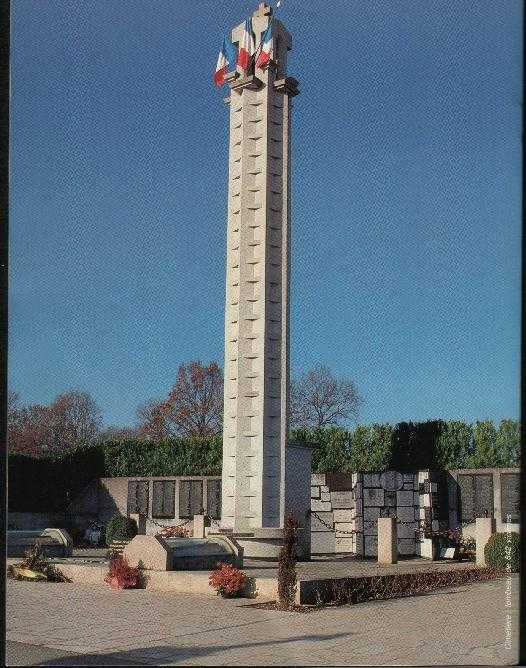Created: 29 January 2002 Updated 21 July 2014
![]()
Created: 29 January 2002
Updated 21 July 2014
|
I help you with information, please help me. I need funds to keep this site going. Donations can be sent via my paypal button, it is easy and its secure. Email me if you want to send a cheque. |

10 June 1944
|
Limousin/Dordogne
Copyright © Mike Kemble & Gijs van den Bor (Images below) 2005
Oradour sur Glane is what the English call "in the back of beyond"; or Americans, "in a backwater". The region saw practically no German activity during the whole of the occupation of France in World War 2 and there was no Resistance activity either, as there were no Germans to "resist". The only time the citizens of Oradour sur Glane saw a German was when one stopped of for a meal in the cafe or restaurant. So it was with curiosity the locals greeted a company of SS Soldiers who arrived in the village on a hot, quiet, Saturday afternoon in June 1944. The Allies were already ashore in the north, but here in the south west of France nothing had changed for years and showed no signs of doing so, until now. Some of the villagers got a little worried and ran off and hid themselves away but, in the main, most just stood and watched. Within a couple of hours, 642 men, women and children would lie dead amongst the ashes of a once peaceful village. The few that did survive had no idea why their village had been singled out for such savage "retribution", in fact many people still do not know to this day. Since I placed this page online I, like most others, believed it was in retaliation for Resistance activity and the kidnapping and murder of a German Major. Only the previous day, 99 men had been publicly hanged in Tulles in retaliation for Resistance activity. The Germans made no secret of it - indeed, they broadcast it to deter further Resistance Fighters from attacking the Germans. But, in the case of Oradour, they tried from the start to hush it up. After the massacre, they ordered the Gestapo to stop anybody from getting anywhere near to the village. So, why the secrecy? Like a lot of incidents of World War 2, this is shrouded in controversy and conjecture. Was it Resistance retribution or the result of an arguement between a villager and a German officer? (See below - Possible Reason). The Nazi Occupying Forces in the shape of a Regiment of the "Das Reich" Division, entered Oradour Sur Glane on the 10 June 1944 and butchered all the menfolk. The women and children were herded into the town church and allegedly set fire to the church, burning alive all inside, approx 400 people. Later scientific evidence suggested that the flaming intensity of the fire was too hot to have been caused by "piling timber against the doors and lighting it". It is thought that possibly the French Resistance had used the Church as a weapons depository, including explosives and that this is what caused the inferno. What ignited the fire? Did the Nazi's deliberately burn these people alive? Even allowing for the barbaric nature of these people, this seems a little bit too hard to stomach. It would have made sense, even with the Normandy beachheads only 4 days old, to transport these people to labour camps or whatever, but not to incinerate them so barbarically. The French will of course defer to the commonly held belief that what they say, their version, is the truth. Naturally this is a very normal reasoning. Is it clouded by outrage, determination to find guilt where it is supposedly apparent? Did the Resistance use the Church as a weapons dump? There are many sites on the web that refer to Oradour Sur Glane; some of which are linked below. Below is also a full eye witness account of this day. Thanks also to an ex Army friend of mine, Paul Robinson, who provided me with photo's. The SS encircled the village and assembled all of the population, including some visitors, for what at first appeared to be a routine identity check. But, once it had been ensured that everyone was accounted for and that there would be no witnesses of what was going to happen, all of the villagers were separated and locked away: the 450 women and children in the small stone church, the 200+ men in various barns and garages throughout the village. In the inevitable conclusion, after what must have been an agonising wait, the assembled villagers were massacred by guns and grenades before their buildings were set on fire. After most - but not all - had been killed, the Germans proceeded to demolish every building in the village, including those in which some of the victims still remained alive, by explosives and fire.
Whatever the plans, some of the villagers did manage to escape, five men from one of the barns and one lone woman from the church, to witness what had happened. By nightfall that day, after the SS had departed, the entire village was in ruins and all the remaining population - men, women and children - lay dead, still locked inside burning barns and the church. ORADOUR-SUR-GLANE(Central France. June 10, 1944) On their 450 mile drive from the south of France to the Normandy invasion area, the 2nd SS Panzer Division 'Das Reich' (15,000 men aboard 1,400 vehicles, including 209 tanks) under the command of SS General Lammerding, arrived at the small town of St. Junien (12 miles from Oradour). Following many encounters with the local Maquis, they marched to Oradour (the excuse used was that they believed the town to hold large stocks of weapons and ammunition for the Maquis) and about 2pm surrounded the village ordering all inhabitants to parade in the market square. (This is what was originally believed) Women and children were separated and locked up in the local church. The men were herded in groups into local garages and barns and then shot, their bodies were covered with straw and set on fire. The 452 women and children in the church were then killed by grenades lobbed in through the windows. The church was then set on fire after a series of explosions. Incredibly, one woman, Mme Rouffanche, escaped by jumping through a window, she was the only witness to the carnage in the church. Unspeakable atrocities were committed throughout the village, but five men managed to escape. The world heard of the massacre nine years later when some of those responsible were brought to trial. In 1953 a French Military Court established that 642 people (245 women, 207 children and 190 men) had perished. The commander of the SS unit at Oradour was thirty-two year old SS Sturmbannführer (Major) Otto Diekmann. He was later killed in action in the Normandy battle area. Twenty other members of his company were sentenced to death but later their sentences were commuted to terms of imprisonment. All were released by 1959. SS General Lammerding died peacefully at his home in Germany on the 13th. of January, 1971. Today, the village of Oradour-sur-Glane stands in ruins, just as the SS left it. |
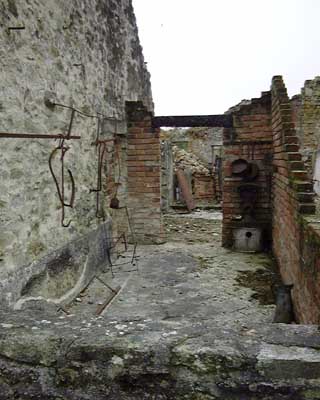
 |
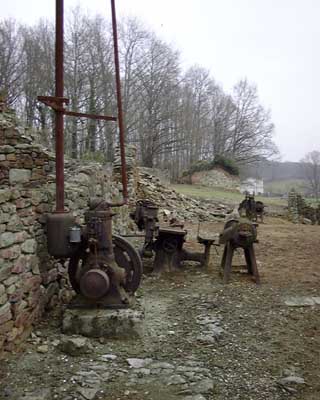
 |


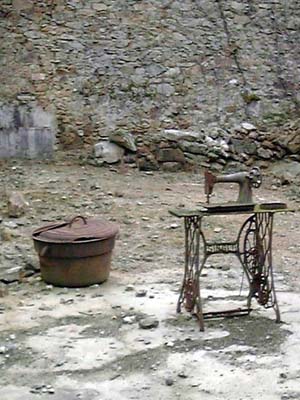 |

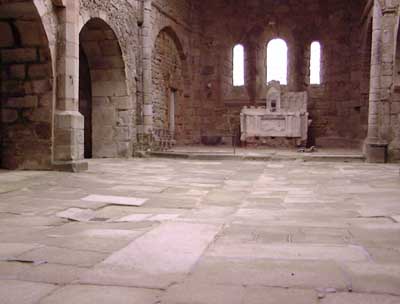 |

 |
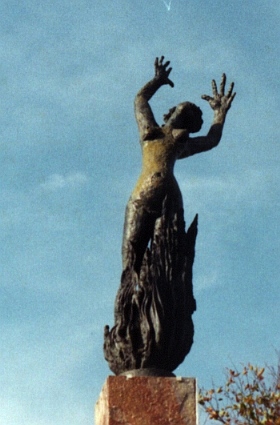 |
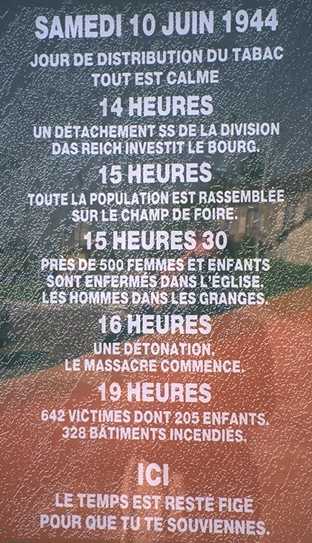 |
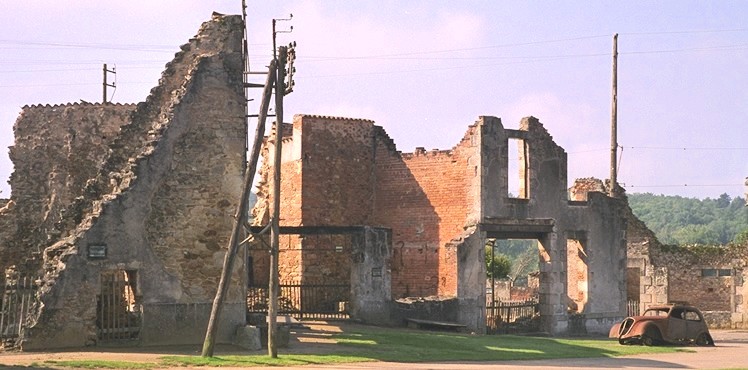 |
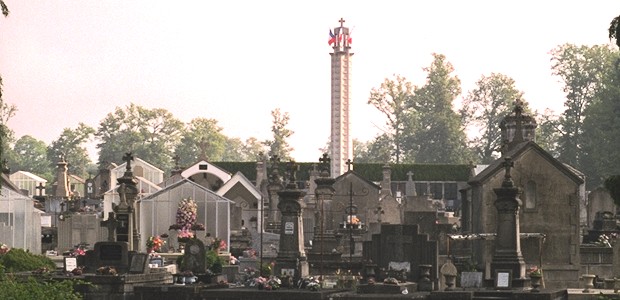 |
 |
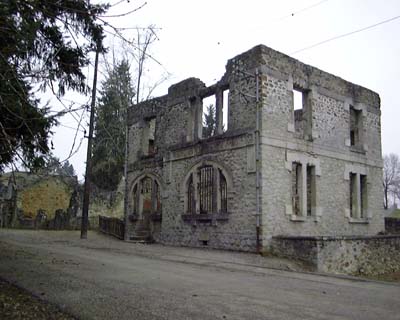
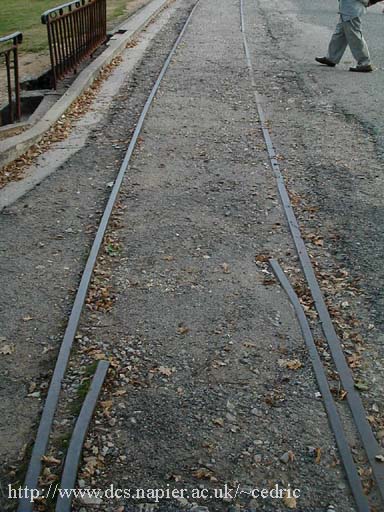 |
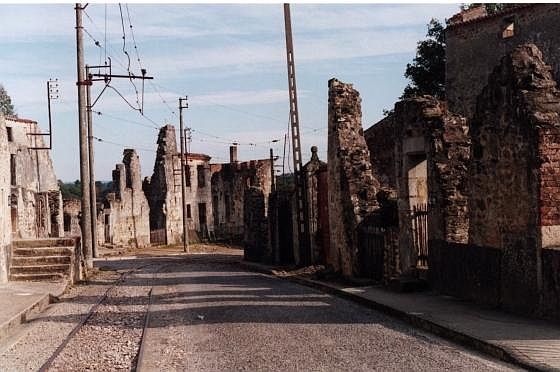
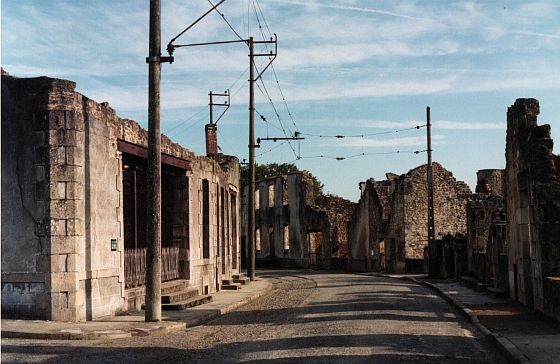 |
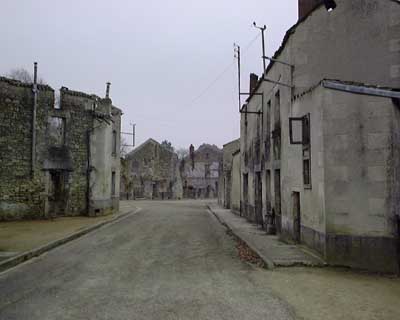
 |
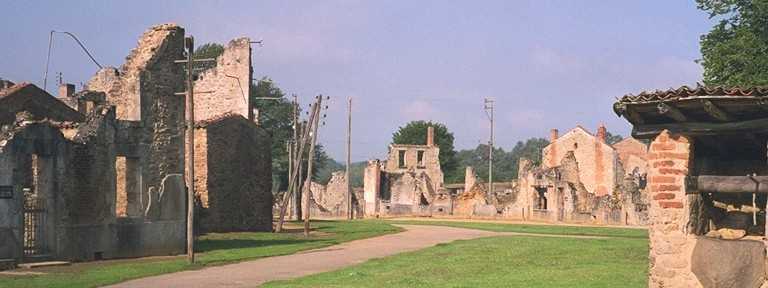 |
Possible Reason
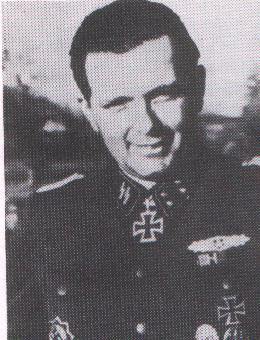
Since writing the above I have found out the some of the Germans involved were captured by the Resistance prior to this and, peeping out of the side of the vehicle they were in, One, a Lt Gerlach, saw a sign on the road which read Oradour Sur Glane, which was where, he thought, he was taken. A Major Kampfe was captured and executed by the Marquis. The fact was reported to his superiors. Also, on a different tack, the same officer was not taken to Oradour at all but another nearby village. A survivor of the massacre, Robert Hebras, verifies that Oradour had no Resistance activity and certainly a half naked Lt Gerlach was not in Oradour on 9 June 1944. Apparently the Germans got the wrong village. I have just come into possession of a book, "Oradour - Massacre & Aftermath" written by Robin Mackness (c) 1988. It claims to have uncovered the real truth. We shall see? In doing research for items, I have come across conflicting versions so often its unreal! So I reserve judgement for now. Some people email me to say that a well documented historical event never even happened, it takes all sorts I suppose. The author does state quite clearly in his book that there is no way he can 100% prove Raoul's story, unless someone else comes forward BUT there are so many facts mixed up in Raoul's narrative that it is almost certainly quite true. It does fit in with the behaviour of the SS, of manic Major Dickmann, the events and what was said at Oradour. It all fits together like a jigsaw puzzle, no pieces appear to be missing. The Build Up Back to the book. Oradour had no strategic nor tactical advantages to either the Germans nor the Allies. Until now it had been a tiny dot on a large map of France and was passed by with hardly a glance. It was really quite simple - nothing ever happened in Oradour. Das Reich SS Regiment recruited mainly from the region of Alsace, a region of France annexed by Germany and many of the boys, men, in the Regiment would have French origins. Possibly one reason why many French people are still reluctant to mention Oradour, shame perhaps? After the war, bitter recriminations erupted, mainly between Frenchman and Frenchman. The occupation of France divided the country in more ways than physical boundaries, it divided neighbours and friends. Many actively supported the Nazi's, others immediately looked for ways to fight them. I would guess that the French political system of far right and far left became even more so, the far left doing the majority of Resistance work. Over time, witness reports become blurred with the telling and stories changed over the years. The witness becomes convinced, not through their own fault, that events took place that didn't actually happen. Its a mind thing, not on the conscious level. The most accurate account of what took place is quite possible a Report published by the French on 17th December 1945 entitled Glimpse of Hell, or Horror "Vision d'Epouvante". The witness recollections were still vivid and clear in the mind. Unfortunately, for accuracies sake, the author depends upon details given by people who wish to remain anonymous and in the case of the main source, now dead. This could be construed as possibly giving way to fanciful conjecture, even inventiveness of the narrative due to the fact there is nobody who could or will come forward and say "But I did not say that" or "This is untrue, I was there". However, at this moment in time I prefer to believe that the author stumbled upon the "truth" by accident in the course of a dealing that maybe he should not have been involved in, causing his incarceration in a French jail. His source "Raoul" was apparently involved in dodgy dealing of gold shipments to Switzerland, against French law, and highly punishable. When he was due to act as a courier for this shipment, part of the journey, he got suspicious and demanded the full story of how this "Raoul" came into possession of the gold, and Oradour entered the conversation. Raoul grew up in Leipzig, son of a wealthy jeweller who had married a Jewish woman. Anti semitism was creeping like a cancer through the streets and a young Raoul saw his near naked beautiful sister taken by the mob for "corrective training" never to be seen again. The family moved to Alsace and there they changed name. By 1938 Alsace was too close to Germany for comfort and they moved to Toulouse and settled in Valence. The area was thick with refugees, mainly from the Spanish Civil War. After his sisters disappearance Raoul never discovered till much later the stress his parents were under. He never knew what his father did as business in France, and never thought to ask. With the war and the German march into France, Toulouse became part of Vichy. His family were comfortably off, and always seemed to have enough of everything. To avoid labour "press gangs" from the vichy Police, Raoul was sent to Pau, near Spain and here he met his wife Janine. He drifted into the Resistance. With his Jewish parentage, and the Germans rounding up labour for work in German factories, Raoul went to ground and in 1944 was selected for sabotage training in preparation for the expected invasion. After training he arrived at a rendevous near Villeneuve sur Lot and met two Englishmen. One took him to one side and told him that an SS Panzer division was due to arrive in Toulouse. When the invasion came, the Resistance's task was to harass this SS Unit and slow its probable progress northwards. This knowledge was yet another piece of valuable information gleaned from the Enigma code breakers at Bletchley Park. The British knew even before the Das Reich Regiment. A huge operation was in progress and Raoul was only a tiny part, the whole being a massive headache to the Germans. He found out that his parents had been denounced and despatched to concentration camps in Germany. He made sure that the man died, very slowly, and afterwards he felt physically sick, the young man he had just killed had been a neighbour and they had travelled to school together. On a warm evening on the last day of May 1944 the long awaited radio message arrived and they knew the invasion was imminent. Raoul made his way north to his designated "area", a remote area near Siorac. Apparently every member of the village was Resistance in one form or another. On arrival at a safe house near Chaillac, Raoul was assigned 6 men, rather no more than boys, being around 16 years of age. He was told that the Allies had landed in Normandy. Amid great excitement he also learnt that the Das Reich Division was also on the move, northwards, on roads, as the rail links had been sabotaged. On Thursday 8th June Raoul was told his targets. A site just north of Nieul on the Limoge - Ballec road, being a rail bridge and the other, a section of road. Friday 9th June Raoul and his "men" were preparing to leave when the quiet of Chaillac was disturbed by the rumble of heavy engines as a huge convoy of SS trucks and half tracks roared down the hill into St Julien, forcing Raoul to rethink his tactics. He decided to move out that night. Major Dickmann jad received orders to rejoin 1st Bn Das Reich Regiment and was to proceed to St Julien. Partisans, 2 days previous, had bombed an important railway viaduct, botching the job, but ensuring that it was too dangerous for trains to traverse it. Passengers had to dismount at one side, cross by foot, and reboard a train waiting on the other. Amongst one group of passengers were 10 German soldiers and they were ambushed, 2 soldiers were killed. The Commander of Das Reich division, General Heinz Lammerding, had his signature on several documents authorising "anti partisan" activities for the soldiers. This usually meant the destruction of villages and their occupants. This had been achieved when the Division was based in Russia. The results had been enormously destructive. Indeed, both sides in Russia took prisoners, tortured them and then had them killed - usually within site of the other side. In March 1944, the Das Reich Division had lost 15,000 men and the remnants had been sent to springtime France to regroup and recover strength. Only 2500 soldiers arrived in France. Most of the new recruits came from the Alsace region of Germany, which had been France before the war. Young men who had grown up French had found themselves as Germans since Germany had annexed Alsace. They were now being recruited into the German Armies. IN March, a company of soldiers led by a Major Kampfe, were out north of Montauban, terrorising the locals, trying to scare them into not daring to assist the Resistance. During wholesale looting they came across several bars of gold. These were handed over th General Lammerding who already possessed some Reichbank bars, held by him, in trust. This terror tactic was known as Ratissage and in early May 1944, they were stepped up. The most appaling atrocities were committed by the "old" regulars as a way of whipping up the Alsace soldiers and giving them a taste of action and the stomach for killing. A grandfather and his 2 year old grandchild were tossed into the flames of a burning house. A father pleaded with the Germans to allow him to hug his 15 year old son, then they were shot by a single bullet by a laughing SS soldier. An 80 year old woman, frightened by the soldiers discharged a shotgun in her terror. She and 2 nieces were publicly hung in front of the town, their bodies then flung into the river. Systematic looting went on, all over the countryside. Using Resistance activity as a pretext for all of this, the truth was very different. Lammerding was expecting a landing in the Bordeaux region. He thought Normandy, when it occurred, was a diversion. By now he had amassed 600 kilos of gold, nearly a half ton. But what to do with it? They decided it would travel north with them, crated and labelled as "records". Flat cars were in use to move the 300 Panzers, low level transporters. An Englishman, with two incredibly brave French school girls aged 14 and 16, drained the oil out of all the axles and replaced it with abrasive paste specially flown in by the RAF. Every single flat car, without exception, seized up. Not only was this an incredible piece of sabotage, but the oil had been kept and sold on the Black Market! The nearest railhead for the division to get to was, ominously, Limoge. The sabotage also had a knock on effect, moving 300 tanks by road used up vital fuel. There were also 1400 other vehicles including heavy armour, 15000 men and equipment. And the Maquis were out there waiting. By Thurs 8th June the division was spread out over hundreds of square miles. 60% of the Panzers had become unoperational, not battle ready and a promised fuel train was bombed and destroyed by the RAF. Nearby, in Tulle, 17 Maquis had taken the town from 139 Garrison troops. But they had murdered 40 prisoners in cold blood. That same night, the SS retook the town with the loss of 3 men. Came the dawn, came the reckoning. 99 townspeople were hanged from lamp-posts. There would have been many more but the SS ran out of rope! 101 were deported to Germany, most never came back. Lammerding sat in a cafe drinking wine whilst the executions took place around him. They then left and took the road to Limoge, 80kms away. He was reluctant to move his precious gold through some heavily wooded region and detailed Dickmann to roganise an alternative route - directly towards Raoul and his men making their way towards their targets. At midnight, the gold left on the Limoge- Bellac road. The scene was set and the SS and Raoul marched onwards towards their respective destinies. Itwas now the night of Friday 9th June 1944. The sounds of tracks on the road reached the ears of Raoul and his party. Raoul ordered them NOT to attack the small convoy under any circumstances, reminding them of their intended, more important target at Nieul. As the vehicles passed by the hidden Maquis, one of the youths suddenly jumped up and tossed a grenade into the passing car, which erupted in a ball of flame. Chaos ensued. Raoul got a grenade out and lobbed it through the window of the truck carrying the "records". Due to the inability of the youths to carry out orders it was a classic example of how NOT to set up an ambush. Some of the surviving soldiers ran for it, and Raoul found three wounded in the truck, he killed them with a burst of sten gun fire. The youths were dead except one, whose head was nearly severed, Raoul cradled him as he died in his arms. The idiot who could not obey orders was found, with scarcely a mark on him. He was possibly killed by blast. Raoul then found the gold. He saw the Reichbank mark on some of the bars, reminding him that he had once been German. The night was deathly still. With a massive effort Raoul buried the gold, in 30 small but heavy boxes, by the side of the road, carefully covering it up with turf. The 6 dead Frenchmen and the remains of the Germans were torched in the vehicles, and he left the scene. Saturday morning at 0600 hrs, Major Dickmann was woken up by an aide and informed that he was to ring Lammerding immediately. Being woken up, lack of sleep and a difficult phone service frayed Dickmann's temper to anger. When he did speak to the General, all that was said was that he was to get to Limoge within the hour and the phone was slammed down. The meeting was overheard by an SS telephonist to be a noisy one. The two officers scremaed and shouted at each other. The previous day Major Kapfe had been kidnapped by the Maquis returning from a raid and patrols had been out all night searching. It was on one of these patrols, south of Limoge, that they arrested Violet Szabo, a beautiful British agent, her fate was not pleasant. The news of Kampfe's disappearance only added to Dickmann's fury. Kampfe had been kidnapped by the same group that had just blown up a bridge at Brignac. He was taken to the village of Cheissoux, a few kilometres east of St Leonard, and it was here he disppeared. His grave marked "Soldat Allermand" was later to be shown to the author by the man who claimed to have buried him. During the course of the heated debate, one or the other of the officers had placed a finger on a map, on Oradour, and claimed that the missing gold must be there. It was only 4 kilometres away from the ambush site. Dickmann was given his orders - find the gold by 2000 hrs that night and report back to the General. Kampfe's kidnapping was only an excuse, they wanted the gold back. A meeting then took place which probably decided the fate of the village there and then. Dickmann met with a Lieutenant Gerlach, who had also been kidnapped, but had escaped in only his underwear. Gerlach is supposed to have told Dickmann that Oradour was one of the villages he had been taken too. Dickmann saw Oradour as a Resistance hotbed, expecting a pitched battle maybe. Gerlach named Oradour in testimony he gave to a Bordeaux tribunal in 1953. But survivor Robert Hebras categorically states that NO resistance activity took place in Oradour on the Friday and certainly no german truck containing a near naked German officer went there. Gerlach had just made a very tragic mistake. Kampfe had been kidnapped near to Oradour sur Vayre, but certainly died in or near Cheissoux. Dickmann also knew that Kampfe's car had been found, 50 kms away from Oradour sur Glane, twice the distance from the "other" Oradour. Dickmann was under orders to either free the prisoner or take hostages. It is doubtful whether the latter even crossed his mind. The SS never acted without reason, Raoul's story to Robin Mackness provides the final vital clues as to why the village was not only exterminated and razed to the ground but why the SS and the Gestapo went to great pains to stop anyone approaching the area, to cover it up. The SS convoy assembled at 1330 hrs. 120 men in 2 half tracked lorries, 8 trucks, a motorcycle and dickmann's car, a Citroen 2CV. Lt Lange was Dickmann's driver and they had a radio set, which Dickmann used on several occasions as they drove to Oradour. Dickmann stopped at the site of the previous nights ambush and studied the scene. Nothing was left, a few helmets, weapons, burnt bodies. No sign of the gold of course. As Dickmann had taken quite a while in preparation for this there is little doubt he knew exactly what he was to do. His men were frightened of him, seeming to be in a "demented fury". He issued written instructions, another unusual occurrence, as orders for this sort of operation were usually verbal only. He wanted no mistakes. Heinz Barth, an NCO, remarked "You will see blood flow today, and we will find out what the Alsatians are made of". He was later sentenced to life in 1953 in Bordeaux. Dickmann left the scene and the convoy proceeded to the wrong Oradour! As they approached the area, soldiers went into farms on the southern approach and ordered all personnel into the trucks, including children and babies. As they left the farms they looked back to see them being torched and blown up, nobody was coming home to these farms, again. Oradour was listed as having 254 buildings, more like a small town. 2 hotels and about 24 shops. One of the trucks made its way directly through the village and blocked off the exit on the other side. Troops disembarked from the trucks and ran to pre determined positions. The people were obviously alarmed but nobody panicked, after all, they had done nothing wrong! Oradour was crowded that hot, sunny Saturday afternoon. The normal population of 330 was swollen to about 650 with people in from surrounding farms for the weekly tobacco issue and 30 refugees from the Spanish Civil War were resident also. It was also medical check time at the schools, with 106 in the girls school, 64 in the boys school and refugee children from Lorraine numbering 44. A white flare was ignited in the main street, the signal that the area was sealed off. Soldiers spread out though the village smashing in doors. They found old people too ill to move, many were shot as they were found, others kicked and rifle butted into the street. Anyone running off was easily picked off. By 1440 hrs the entire population was assembled in the Square, 650 people. Dickmann was getting irritated, he only had just over 4 hours left to find the gold and then leave for Limoge. He informed those present, via two French interpreters, that they were to be searched for weapons and required 30 hostages. The mayor said they they had no weapons in the village and volunteered himself as hostage. The SS then segregated the women and children from the men and marched them off in the direction of the church, ordering that if any of the men turned to watch the procession they would be shot. One of the Alsace soldiers was visibly upset at the sight of the children and a family hiding in a cellar heard the march of the children's clogged feet as "drums of death". They were all crammed into the church. There were now about 200 men in the Square, covered by SS troops. The men were split into several barns. Dickmann was by now losing his temper, things were taking too long. He nodded to Captain Kahn who drew his pistol and fired a single shot into the air. This was the signal for the massacre to begin. THe SS threw open the barn doors and began firing and shouting loudly. 30 seconds later the firing petered out. At the church a large strange box was carried into the church and three fuses were lit, it began to pour out acrid fumes but was taking too long so that the soldiers lobbed grenades into the Nave and raked the church with machine gun fire. the fumes drove them out of the door so they continued to lob grenades in through the windows. Inside was a blazing inferno. One SS Lt, Knug, was killed by falling masonry. When the SS had opened fire at the barns, aim was deliberately kept low, taking most of the victims in the legs. Dickmann arrived and entered a barn, not more than a few were already dead, obviously well planned. An old man was lying by the wall, crying for his wife. Dickmann, with theatrical aplomb, waited whilst eyes turned to him, then he shot the old man though an eye. He questioned men for 10 minutes then shot each one and stormed out of the barn, ordering the men to torch them all. The screams of the dying echoed above the roar of the flames.
The young man with the
impetuosity at the ambush site, who could not obey an order, the German
Lieutenant who got the wrong village, the mysterious Raoul, who took the gold,
the major with a terrible temper. A veritable catalogue of occurrences that
resulted in a destruction beyond comprehension.
The following images were taken by a Dutch policeman and were kindly sent to
me on a CD.
Gijs van den Bor is his name. The same gentleman has
made a video montage of this massacre which can be viewed by
clicking here for
the Dutch Version and
clicking here |
|
|
My thanks to Gijs van den Bor
for the following images. They are copyright and are reproduced with
permission. He is a dutch policeman who visited OIradour in 2005 and send me the following: Copyright © Gijs van den Bor 2005 Images & Video - http://www.gijsvandenbor.nl |
|
|
|
|
|
|
|
|
|
|
|
|
|
|
|
|
|
|
|
|
|
|
|
|
|
|
|
|
|
|
|
|
|
|
|
|
|
|
|
|
|
|
|
|
|
|
|
|
|
|
|
|
|
|
|
|
|
|
|
|
|
|
|
|
|
|
|
|
|
|
|
|
|
|
|
|
|
|
|
|
|
|
|
|
|
|
|
|
|
|
|
|
|
|
|
|
|
|
|
|
|
|
|
|
|
|
|
|
|
|
|
|
|
|
|
|
|
|
|
|
|
|
|
|
|
|
|
|
|
|
|
|
|
|
|
|
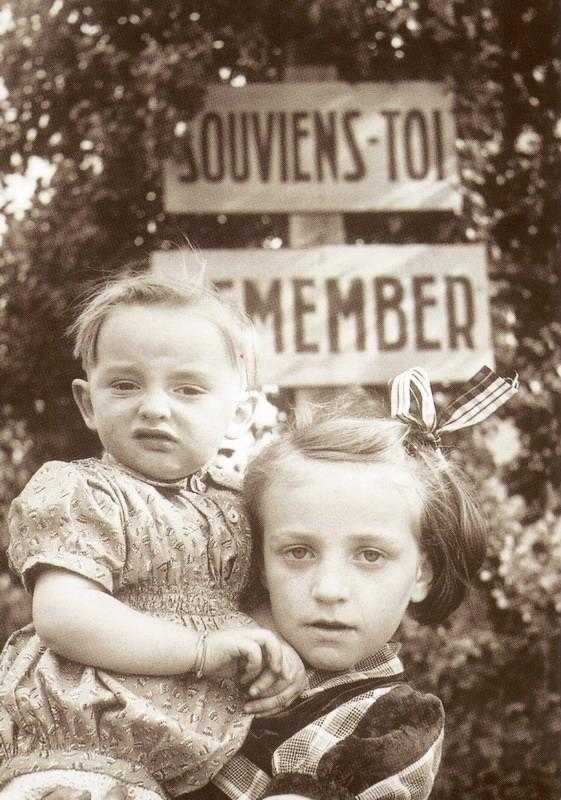
An Account by a Survivor: Robert Hebras The tragedy which struck Oradour-sur-Glane developed in a few short hours. Those moments of unthinkable atrocity obliterated the lives of some and broke those of the few survivors. Some of them lost everything: family, possessions and records of their past. The memory of those who died in frightful suffering is their only inheritance. A memory blurred by the nightmare which remains forever engraved on their minds. The fact that so few survived that savage slaughter is a testimony to the efficiency of the German plan. That is why the record of certain events, the Germans' entry into the schools, for instance, or, more particularly, the massacre of the women and children in the church, could only be built up from the findings of the inquiry, or from my knowledge of some of the leading characters, for the only possible witnesses died in the slaughter, (apart from Mme. Rouffanche, the only woman to escape from the church). Moreover, in the years that have followed, the reasons why the S.S. committed such a crime against humanity have never been determined. The Germans themselves have put forward several, either immediately after the murders or during the trials which took place after the war. As a consequence, this point must be considered with both care and reserve. I would also like to point out that, during the events leading up to the massacre, I did not sense the slightest sign of brutality on the part of the Germans. Other survivors have described violence inflicted on themselves or others. These differences should not cast doubt on the veracity of statements, even where they do not agree. The explanation is to be found in the widespread nature of the massacre; what one saw may not have been seen by another; the main reasons for the differences are the considerable number of people present at the time, and the wide variety of killing grounds. What happened to the murderers after their crime ? Some were brought to trial, either in Bordeaux or Berlin, the others escaped retribution, I wanted to tell the story as clearly as possible, so that generations to come might understand how the tragedy unfolded, and realise just how people may suffer from the savage cruelty which springs from intolerance, be it religious or political. May it help in remembrance, so that such things may never again occur. Today, it is almost impossible for the visitor to imagine what this Limousin village might have been like before the tragedy. The ruins, which still bear witness to an act of cruelty, inhibit any idea that life there could have been peaceful and normal, until that fateful day of June 10 1944. The outrage has grievously inscribed the name of Oradour-sur-Glane in the rolls of history, a desperate fame for those who died without ever knowing why such atrocity should befall them. When General de Gaulle visited the scene, some time after the massacre, he wanted the ruins to be preserved, so that future generations might see, realise and never forget where such evil folly may lead. The ruins are still there. They demand respect and sorrow of all who see them. Those tattered shreds of twisted walls that now give no one protection; those electricity lines which no longer have a purpose; those tramlines leading nowhere; those signs of long forsaken shops, make Oradour-sur-Glane a melancholic place. What connection can there be between these desolate ruins and a village full of life? None, save the murderous insanity of man. (Continued below) My Native Village When my mother gave me birth, Oradour-sur-Glane was but one of the many Limousin villages such as are still to be found today. Clinging to the flank of a verdant hill and washed by the Glane, the village led a peaceful life, in perfect harmony with Nature. The proximity of Limoges and its attractive suburbs gave it a life and vigour that was the envy of more than one village in the neighbourhood. The town folk of the time would often come for a few happy hours, to picnic, or to fish in the Glane, a little river, known to be well stocked. In catering for this trade, many hotels and restaurants rivalled each other, either in the quality of their welcome or their delectable cuisine. Oradour forged for itself the reputation of a quiet, pleasant village, where it was good to pass the time. The village stores were well stocked, and people even went out of their way to do their shopping there. You could find anything you wanted, and be sure of a friendly welcome from tradesmen who gave advice and an attention that went beyond what was usual. The church, a remarkable piece of architecture, was particularly notable for its superb ogival vault resting on four columns carved with figures. There were three schools for the village children, The boys' school was opposite the tram terminus, the girls' school consisted of two classes, and was in the centre of the village, and the third, the infants' school, was on the Nieul road and corresponded to what is, nowadays the kindergarten. Towards the end of 1940, the arrival of refugees from Moselle, evicted from their homes by the Germans, necessitated the opening of an additional school. This was built near the kindergarten, and charge of the class was given to Monsieur Gougeon, a teacher who had himself been expelled from Moselle. The Trams At that time, Oradour was connected to Limoges by trams, which made the journey several times a day. My father was a chief-electrician, in charge of one of the teams responsible for the maintenance of the line. The tram played an important part in the economic life of the village, since it made it possible for a number of people to live in Oradour and commute to work in Limoges every day. Over the years, the arrival of the tram in the late afternoon, (in the summer months), was eagerly awaited by the youth of the village, for, at precisely seven o'clock, (when the tram arrived from Limoges): boys and girls would meet at the terminus and stay to talk for an hour or two. The rendezvous was known to all and regarded with indulgence by the adults, for much courting began there and it was not unknown for furtive kisses to be exchanged in the falling shadows of evening, Daily life Almost everywhere in France at that time, cafes were numerous, and Oradour was no exception. You should realise that some of them were set up in rooms whose only furniture was a few chairs and a table. After a day's work, but especially at the week-end, the men would gather there to chat, or play pontoon, whist being reserved for more eminent personalities. My father was a regular at the Oak and, only on Sundays, would let me go with him to drink a lemonade with my friends. That day was the liveliest of the week, for all the shops were open. After mass, the women would do their last bits of shopping for Sunday lunch whilst the children would spend a few pence on toffees, or other cheap sweets. Few of the men went to church, they would take advantage of the early sun to have a game of cards on the cafe terraces. The "special" tram would arrive at the beginning of the morning and shed its load of "townies" from Limoges. Whilst some besieged the restaurants, others would wander down to the Glane, to catch a few gudgeon. The adults were not too fond of these "townspeople", who were too stuck up for their taste, and whose swaggering attitude was not much of an incentive to conversation. The opinion was not shared by the children, who were delighted by all the activity. In the afternoon, dances were usually held, at Avril's or Milord's or at Dagoury's- places where the youth of Oradour and the neighbourhood would meet. During the week before the last Sunday In August, the children were always afraid that they wouldn't come. But, as soon as the first one set foot in the town, their anxiety turned to joy and excitement. They would stand, wide-eyed, on the fair-ground, as the roundabouts were set up for Oradour Feast, an event which, every year, drew people in from miles around since, for many, it was an opportunity to meet old friends and to enjoy themselves, Dances, bands, stalls and roundabouts gave pleasure to all who came to get away from their daily life which, at that time, was not always easy. The Feast would begin on Saturday and finish on Monday night. In August 1939, the roundabouts had arrived, but the rumours of the declaration of war prevented their being set up. Our heart wasn't in it. For several months they stayed there, silent and forlorn. The attractive village of Oradour was about to go through the Occupation in stony apathy. What military strategist could possibly be interested in a village so far off the beaten track? Yet its reputation for its welcome would endure throughout the dark years of war, and attract many refugees in search of a haven of peace. The only blot on the landscape was the anxiety felt for the young men who were prisoners-of-war, or conscripted for compulsory work in Germany. (STO) Hour By Hour
The previous evening, my father had asked me to go and fix a wall plug in our neighbour's house, because, he said, her daughter had given her a small electric stove. I usually worked on Saturday, because I was a mechanic in a garage in Limoges. On Thursday, the 8th, my foreman had had a sharp exchange of words with a German officer who had then left, making some alarming threats as he went. Although my foreman was in the right, he preferred to dismiss me and two others of my age, rather than risk our being called up for compulsory work service (S.T.O.). So, I had come back to Oradour on the Friday. After swallowing my breakfast, I took the tools I needed and went straight to our neighbour's. The grey sky hung heavy over the village, and an occasional drizzle mantled the pavements. When I had finished the job, I went back home for lunch. My mother reminded me that my father had gone off early, to help a farmer take his cows to Saint-Victurnien, for the occupying powers had requisitioned several the day before. He had gone on his bicycle and wouldn't be back until late afternoon. Georgette, my elder sister, was helping my mother to get the meal ready. She had come back to Oradour because of rumours that Limoges, where she worked as a nurse, might be bombed. Towards noon, Denise, my little sister, returned from school and we then had lunch. After lunch, my friend, Martial Brissaud, called round. The sun had now returned and its warmth easily pierced the few clouds remaining. We went out, and started to discuss the next day's football match. The Oradour Sports Club had been founded in 1942, and included a football team that had rapidly acquired an enviable reputation. We both played for it. Denise, my little sister, came to give me a kiss before going back to school, watched affectionately by my mother, who had come to the door to see her go. A short while after, we heard the rumble of engines coming from the lower part of the village. I looked at Martial in surprise, because vehicles were unusual during the war. The only Germans to come through the village hadn't even stopped, and that had been two or three years before. It must have been 2 p.m. Two half-tracks came round the bend by Emil Desourteaux's grocery shop and passed where we were standing. Soldiers in combat gear looked at us without interest. "I don't like it!" said Martial. "Why not? There's nothing to be afraid of. I see them every day in Limoges", I replied. "Well, I'm afraid, and I'm off". "Aw, come on, they're not going to eat us!" I had hardly got the words out before Martial left. He passed Andre Bardet. a friend of our own age, but didn't stop. Then he hurried past the town hall, where M. Desourteaux, (the mayor), was in close conversation with M. Rousseau, the schoolmaster. The mayor asked: "Where are you rushing off to?" "I'm going to hide", replied Martial. "You can come and tell me tomorrow where your hideout is." added the mayor, laughing. He told me afterwards that he had taken a roundabout path home, avoiding the streets, so great had been his fear of the Germans. It was this that saved his life. In the meantime, the half-tracks had reached the end of the village and had turned round. The soldiers had got down. I went home. 0900 Saint-Junien is a small town, about 10 km from Oradour. The first Regiment, "der Fiihrer", of the "Das Reich" division, bivouacked in Saint-Junien on the 9th. of June, Nothing out of the ordinary. Two events had transpired. Two days before, the Resistance had blown up the railway bridge at Saint-Junien, hoping to delay the German troops on their way to the Normandy front, (the Allied landings had taken place on the 6th. June 1944). During this operation, two German soldiers had been killed. In addition, Kampfe, (a personal friend of Major Dickmann), had been taken prisoner by the Resistance close to St. Leonard-de-Noblat, (about 60 km from Oradour, to the east of Limoges). I suppose that these two events decided the S.S. to teach the Resistance a lesson. On Saturday, 10 June 1944, Major Dickmann summoned Lieutenant Kleiss and four militia to plan the destruction of Oradour. The meeting took place in their Command Post, which had been set up in the station hotel at Saint-Junien. 1330 The column set out about 1.30,p.m. First, (hey took the N 141 as far as « Loubier», and then the D 3. Lieutenant Kahn halted the column at the hamlet of Bellevue, where Second-Lieutenant Barth addressed his men, saying; "Today, you are going to see blood flow!" He then ordered several soldiers to get down and comb through the vicinity, taking anyone they found into Oradour. The convoy set off and. a few minutes later, came to a halt at the south end of Oradour, by the bridge over the Glane. 1400 Major Dickmann set up his Command Post in Masset's farm, which lay between Oradour and the village of Bordes. The plan, devised that same morning, was to be applied with coolness and efficiency. From the bridge over the Glane, a number of troops began to surround the village. Meanwhile, half-tracks, full of men in combat dress, came through the village and took up position on the north road. All the S.S. from these vehicles deployed outside the village, to complete its encirclement. However, two of them came back down the main street to get people out of the house and to assemble in the road. Within a few minutes, the village was surrounded and there was no way out The first phase, which was to assemble the population on the fair-ground and prevent all escape, had begun. I should make clear that, at this stage, I had noticed no animosity from the S.S. The pretext of a simple identity check reassured almost everyone, even the most suspicious. The German tactician knew very well that discipline makes it easier to accomplish tasks and prevent outbursts which can be difficult to contain. 1415 After leaving Martial, I went home and told my mother and sister, Georgette, that the Germans were in the village and were turning everyone out into the street. All three of us then went out to see what was happening. Already, people were at their windows and doors, anxious to know the reason for such a display of force. When my mother saw what was happening, she told me not to go, but to hide behind the house. I replied that my papers were perfectly in order, and that I had no reason to avoid the identity check, which, I will remind the reader, was the excuse given by the S.S. to avoid alarming the population. The sun was now hot, and the humidity made the atmosphere oppressive. By now, a soldier had reached us and ordered us to join the others in the street. As time passed, the numbers of people grew, to the point that I couldn't remember seeing such a crowd in Oradour before. The human column slowly moved towards the fair-ground. There was little conversation, though no-one was really worried. The Germans kept on telling us that it was only a simple check, and then, on my way to the square, I realised that I had left my papers in the house. As it was only a couple of yards from where we were gathering, I thought I would have plenty of time to run back and fetch them if necessary. In our haste, we had all come out dressed just as we were. I was wearing only a singlet. Mothers were carrying their babies for, in the rush, very few had bothered to get the prams out; the Germans seemed in a hurry to get things over with. Once I arrived at the fair-ground, I saw that the crowd was already quite thick. Everyone wanted to know what was happening, though glances were more questioning than anxious. By then, the half-tracks were disgorging civilians, old people, and some I recognised from nearby hamlets. The sight of all these familiar folk made me feel a lot better. Once they had unloaded, the half-tracks left, to return later with fresh passengers, who were surprised to see such a crowd already assembled. The soldiers were positioned all round the square and were levelling machine guns at us. Their caution surprised no-one for, despite the Allied landings, we were still at war. By then, the sun was beating down, and the heat was overwhelming, since there was little shade to be found on the fair-ground. Despite the commotion, conversation was still lively. There must have been at least six hundred of us on the fair-ground. My mother was still very fearful for me, and never stopped repeating that they were going to send me to Germany. I reassured her as best I could. At that moment, I noticed my football pals, and made my way through the crowd to join them. We immediately began to discuss the next day's match, for the opposing side was likely to give us some trouble. Nevertheless, my attention was drawn to M. Compain, the pastrycook, whose shop gave directly on to the fair-ground, and who began to talk to a soldier: "I have just put my cakes into the oven, and have to take them out." "Don't worry, we'll see to it" replied the soldier, in good, though heavily accented French. The poor man was disconsolate at the reply, for he realised that his cakes would not be out in time. He gave a wry smile, and turned to talk to others nearby. People continued to flock in from all sides, some on foot, others in military vehicles. Meanwhile, other S.S. had gone into the various schools in the village, where the classes were, that day, complete. There was no first-hand report of this, for the only possible witnesses (little Roger Godfrin apart), were all killed. The soldiers told the teachers to get the children out and take them to the fair-ground. On the whole, the children were not afraid, though some, among the smallest I expect, wanted their mothers. Only one succeeded in escaping the S.S.
(Roger Godfrin, the youngest survivor of the massacre died in 2001 aged 65) He was little Roger Godfrin, aged eight. He had come to Oradour with his parents at the end of 1940, after they had been thrown out of their village of Charly by the Germans, who gave them one hour to pack thirty kilos of luggage and leave. The Germans had given their homes to "good and faithful citizens." On their arrival, Roger's parents moved into a little house next to ours. They were pleasant neighbours, always ready to help. How many times did I hear Mme. Godfrin say to Roger: "When you see the Germans, run away." This family, already tried by war, had foreseen that the Germans might come to Oradour. though they hadn't seen a single one since they arrived. If it should happen, they were all to meet in the wood, behind the cemetery. Alas, Roger could not get there. When the children arrived at the fair-ground, many of their mothers went to fetch them. They wanted to reassure their children, but their faces barely hid the anxiety which had begun to dawn. In the crowd were a number of men from nearby hamlets, who had come to fetch their tobacco, for Saturday 10th June was ration day. The men would go to the tobacconist and, on presentation of their card, would receive their tiny allowance. Despite the impressive display of force, nobody was really worried. It was true that Oradour had always stood outside the conflict and, despite the Occupation, I have to admit that we had not suffered much from the usual privations of war nor any of the stress of occupation. 1500 Some
soldiers came and separated us, men on one side, women and children on the
other. When the division took place, I was standing next to Madame
Rousseau, the deputy-head of the boys' school. She had a handicapped son,
who was very solidly built, and who was put into the men's group. She
argued for a while with a soldier, who eventually agreed to let the child
join the women. The separation took me by surprise. I wanted to see my
mother and sisters again, When I caught sight of them, they were already
looking in my direction. My mother gave me a resigned smile, and I shall
never forget the look in her eyes, where I saw pity, shock, fear, and an
ineffable helplessness which clouded her love. At that moment, was pushed
away, to line up by the wall with the other men. An order was given in
German, and the group of women set off on the way out of the village. Or
at least, that is what everyone thought. 1530 We had been waiting a long time, so some of us sat down on the edge of the pavement. Conversation began again, for we were all confident that the matter would soon be over, without consequence for anyone. Some of the S.S. were chatting and laughing, and gave the impression that they were on a routine mission, rather than getting ready for mass-murder. Suddenly, the same officer stepped forward, ordered us to be quiet, to stand up and form three ranks facing the wall. The machine guns levelled at us seemed waiting for an order to spit out death. We waited for perhaps five minutes. We couldn't understand what they were trying to do. Kill us? Why? Why weren't we shot there? Nobody knows. Disposing of two hundred bodies can be hard work, and takes time, whereas fire can do it simply and cleanly. For no immediate reason, we broke ranks and turned to face them. The weapons of the S.S. were cocked and pointing at us. We still weren't impressed, for we thought it was more of a threat than a menace. I took advantage of the release of tension to rejoin my friends, under the impassive stare of the Germans. Hardly had I joined them than a soldier divided us up into six unequal groups. The one I was in must have numbered about sixty. The first groups set off in different directions; some to the north, others to the south of the village, then thought that the Germans were going to herd us into several barns whilst they carried out their search, so that no one would be able to escape. I don't suppose I was the only one to think so. My group was easily the largest. We were the last to leave the fair-ground and went down the High Street. We passed Desourteaux's garage, where a number of men were assembled, some leaning nonchalantly against the open doors. None showed any sign of anxiety, even though a loaded machine gun had been set up on the pavement opposite, with a soldier standing by. We continued on our way and, a few yards further on, I saw another group going towards Milord's barn. From there, I could see that the lower part of the village was deserted, and I concluded that the women and children had already left it. We had just taken the road to the cemetery, when one of the escort ordered us into Laudy's barn. This was a huge construction, where several carts and bales of hay were stored. One of the soldiers told some men to move the wagons and make some space. Whilst they were doing that, I resumed my conversation with a friend, for we wondered whether, in the end, the Allied landing wouldn't force us to postpone the match scheduled for the following day. In the meantime, a couple of soldiers had swept the threshold of the barn and set up a pair of machine guns. A wise precaution, in case they got dirty! Several of us younger ones were sitting on the hay. An S.S. came up to us and told us to get up, so that then we were all herded together. The various conversations ceased, one after the other, and we waited. In front of us, two soldiers stretched out behind the machine guns, and two others stood by with belts of ammunition round their necks. Their officer did not take his eyes off us. Like the rest, I waited. It was hot. I recognised one of the soldiers, who was very fat and, every now and again, swallowed a lump of sugar which he took from a capacious pocket. Whilst we were still in the square, I had seen him coming out of Monsieur Faure's house, with the box of sugar in his hand. As the minutes ticked by, we fell prey to an increasing apprehension. A search of the whole village would certainly take a long time, 1 thought. I suppose we all thought the same thing, but nobody said a word. The confrontation lasted for several minutes more, which seemed an eternity to me, though nothing happened. It was more and more stifling in the barn. We felt not a breath of air as we waited, silently standing. 1600 Suddenly, I heard an explosion, probably a grenade. On this signal, the men behind the machine guns settled into position, and fired. In a deafening din and the smell of gunpowder, every man fell, one on top of the other. The cries of pain, the heat, the smell of blood mingled with that of hay, dust and powder, turned the barn into a Hell on Earth. I didn't understand what was happening. Everything happened so quickly, and, when the guns fell silent, wails and groans and cries arose from the heap of shattered bodies. I was underneath several others. I was thirsty, I didn't even know if I was wounded. I felt something hot and sticky trickle down my hand. I lay absolutely motionless, as if dead, heard footsteps. They were those of soldiers clambering over our bodies to finish off the survivors, felt a foot on my back, I did not flinch. Some jerked in death when they were given the coup de grace. How long it was all taking! When would it be my turn ? One of the football players was lying with his head on my leg. He was given the coup de grace and the bullet wounded me slightly, I felt the pain, but as afar off, I was frightened and very thirsty, my wounds were beginning to hurt, and what were they saying, these brutal voices I could hear? They covered us with hay and firewood, and set fire to it. Was I the sole survivor? Amid the crackling of the flames, which were now spreading rapidly, a voice rang out, full of pain and despair, "Ah, the bastards! They've cut my other leg off!" I recognised at once the voice of Monsieur Brissaud, who had lost a leg during the 14-18 war. Other voices were then heard, crying out in pain and shock. And then, what was that music I could hear? In spite of my perilous situation, I tried to find where it was coming from. How macabre! Executions to a musical accompaniment! The fire was spreading rapidly. I stood it for as long as I could, sheltering under the bodies of those who had already breathed their last, didn't hear the Germans leave. When the flames reached me, I struggled to get out, fully expecting to be shot down at once. I was greatly surprised to find I was still alive. I went towards a little door at the back of the barn, and opened it. It gave on to a small yard, with no way out. I turned back and, skirting the fire which was by then widespread, went to another door opposite. It opened into a gloomy stable, saw a shadow in front of me. Frightened, I closed the door and went into another yard, for did not know whether the shadow I had glimpsed was German or French, I heard voices. I stopped to listen. They were French, with a Limousin accent. Even so: I went forward cautiously, and then saw four of my friends: Marcel Darthout, Yvon Roby, Clement Broussaudier and Matthieu Borie. Three out of the five of us were wounded. Where could we go? The fire was spreading, and there was no way out of the yard. Panic seized us. Borie, a mason by trade, noticed that one wall was crumbling. Stone by stone, he made a gap through which we slipped, one by one, to find ourselves in a barn. We were tormented by thirst. A tumultuous racket filled the village. Falling tiles, sporadic shots, explosions of gas bottles and the shouts of the murderers, all made our escapade more terrifying. Borie and I hid on top of a pile of firewood, and the other three took refuge in the loft of the barn. Suddenly, the door opened, and two S.S. came in. One of them climbed the ladder between the wood and the loft. He was no more than a yard from us. He struck a match, which immediately went out, though a second was good. The beanstraw where my three friends were hiding was soon ablaze. The soldier climbed down, and, on his way out, fired incendiary bullets into the roof, which at once caught fire. We waited as long as we could before the flames forced us from our hiding place. Outside the barn was a yard which was open to the fair-ground. From where we were, we could see two sentries patrolling the road to the cemetery. So we waited as long as we could before leaving the barn and hiding in the first of three rabbit hutches that stood in the yard. The fire continued to spread, and soon forced us to hide in the second, and then in the third. It was 7.00.p.m. when the fire reached the last hutch. We avoided being seen by the two sentries, and were once again free. But what a freedom! 1700 The inquiry which took place afterwards established that all the men were murdered at the same moment. There were only five survivors from the six sites of execution. All were from Laudy's barn. If the S.S. had moved their guns a little further back, they could have shot their victims in the upper part of the body. They did not bother. Without doubt, many of the martyrs perished atrociously in the flames, because most of them must have been wounded in the legs. Once the executions were over, a man-hunt was organised. Any witness was systematically shot without trial. Later, bodies were found all over the village, down a farmyard well, in a bakery oven. Did the orders include the obliteration of the village? We shall never know; however, no house or building was spared by the flames. At the end of the first phase, the butchers turned to the second. Had the women and children seen the brutal cruelty of the SS? Could that risk be taken ? Was their liquidation part of the original order, even ? Possibly not. Yet Major Dickmann was a man whose callousness had earned him the reputation of a cold, cruel butcher, and a drunkard besides. Whatever the truth may be, his blood-crazed cutthroats carried out his orders. Here I would like to make clear that what follows is the entire testimony given by Madame Rouffanche. She is the only woman to have come out of the church alive. I have spoken to her many times about the tragic events there. Not once, throughout her life, has she ever embroidered the slightest detail on to her original statement. The church was too crowded for Madame Rouffanche to see everything. It is with the same respect for the truth that I relate her evidence in its entirety. About 2.00.p.m. on the 10th. June 1944. German soldiers burst into my home, and ordered me to go to the fair-ground, together with my husband, son, two daughters and my grand-son. A number from the village were already assembled, and men and women were flocking in from all directions. They were followed by the schoolchildren, who arrived separately. The Germans divided us into two groups; women and children on one side, men on the other, The first group, of which I was one, was taken under armed escort to the church. It consisted of all the women from the town, especially mothers, who entered the House of God carrying their babies in their arms, or pushing them in their prams. All the schoolchildren were there as well. We must have numbered several hundred. Crammed inside the church, we waited in growing anxiety to see what would happen next. Around 4.00.p.m., a few soldiers, about 20 years of age, brought into the nave, close to the choir, a large kind of box, from which hung strings, which trailed on the ground. Between 4.00. and 5.00p.m., these poor wretches must have gone through purgatory, for no doubt they would have heard the frightful noise of shots, explosions and flames. What on earth could they have thought? When the trailing strings were lit, the device suddenly exploded with a loud bang, and gave off a thick, black, suffocating smoke. Women and children, half choking and screaming in terror, rushed to those parts of the church where the air was still breathable. It was thus that the door to the sacristy was broken down, under the irresistible pressure of a terrified crowd. I followed them, and sat down on a step. My daughter joined me. The Germans saw that people had escaped into the room, and cold-bloodedly shot down everyone who was hiding there. My daughter was killed where she stood, by a shot fired from outside. I owe my life to my closing my eyes and feigning death. A volley was fired in the church, then straw, firewood and chairs were thrown in a heap over the bodies lying on the flagstones. I had escaped the slaughter unbounded, and took advantage of a cloud of smoke to hide behind the main altar. In that part of the church there were three windows. I went to the middle one, the biggest, and, with the aid of the stool used in lighting the candles, tried to climb up. I don't know how I managed it, but terror gave me strength. I heaved myself up, as best I could, and fell about ten feet through the broken glass. Looking up, I saw that I had been followed in my climb by a woman who, from the height of the window, was holding out her child. She fell next to me. Alerted by the child's crying, the Germans fired at us. My companion and her babe were killed. I was myself wounded, as I crawled away to a nearby garden. I hid among the rows of peas, and waited in terror for help to arrive. I was not rescued until the following day, at 5.00pm. The findings of the inquiry fully supported the evidence given by Madame Rouffanche. In the murderous madness that drove the killers on, innocent children were ferociously butchered; the youngest was only a week old. 1930 From then on, the village was at the mercy of the flames. In the course of the afternoon, a tram under test (having been repaired) had arrived from Limoges. The sole passengers were employees of the company. One of them, Monsieur Chalard, got out. As he crossed the bridge over the Glane, he was shot, and his body thrown into the river. The S.S. then sent the tram and its passengers back to Limoges. A second tram, the service car, likewise from Limoges, arrived about 7.30.p.m., but this one was crowded with passengers. The guards at the fork to Saint-Victurnien halted it, and ordered its occupants to remain in the car. One soldier set off on his bicycle to seek orders. On his return, he made everyone who lived in Oradour get out (about 20 of them). They were made to cross the Giane via a make-shift footbridge, and were then taken to the village of Bordes, to Masset's farm, where the S.S. had set up their command post. The NCO in charge of their escort spoke to the officer of the guard. They divided the men and women, and checked their identity. Suddenly, they were surrounded by soldiers, who cocked their weapons. The fear of imminent death gripped the wretched hostages. The abominably heartless suspense had dragged on for more than two hours when, suddenly, another officer appeared, and there was a sharp altercation. Almost at once, they were told they were free to go, One soldier then shouted to them: "We're letting you go. You can thank your lucky stars, because we've slaughtered them all." The tram went back to Limoges, and arrived, late at night, with all its passengers, except those from Oradour, who had been left behind and had scattered into the countryside. After the Massacre Despite the murderous insanity which drove them on, the S.S. retained sufficient composure to set about looting the village. They took everything they could from the houses, and what remained they destroyed with implacable zeal. Only after plundering the village did they set fire to the houses. Yet, with an eye to their comfort, they saved one where they spent the night. It belonged to Monsieur Dupic, and was on the north road out of the village, near the Post Office. His cellar was said to be particularly well-stocked with fine wines. The section responsible for guarding the site left about eleven o'clock the following morning, setting fire to the house as they went. It had been the scene of a drunken orgy, as could be judged from the impressive number of empty bottles found among the ruins. The first people to enter the martyred village arrived, I suppose, on Sunday, in the early afternoon. My father was among them, All either lived, or had close relatives, there. No words can describe the scenes of horror that met them. Every step was unbearable agony, so numerous and abominable were their atrocious discoveries. The stench of burned flesh hung over the ruins, still groaning in pain. Here were two entwined bodies, which seemed to have been spared by the flames, though they crumbled to dust at a touch; there, two children, hand in hand, had sought refuge in a church confessional. Their baby faces still wore that look of endearing innocence that only children know. The visitors to this charnel house were sickened by the smell of burnt flesh. Everything they saw stirred in them shock, and a fierce desire for revenge. The vast heap of human ashes was all that remained of a people who, only the day before, had been full of life. Each one made his personal search. It was impossible to recount what they had seen; no words were strong enough to describe the horror. By an irony of life, the only living beings to escape the insane slaughter were the animals left behind by the butchered villagers. On the Monday morning, the S.S. returned, to dig two huge, communal graves, where they tried to conceal as much as possible of the human remains. Their efforts were abortive, for the inquiry saw through their clumsy camouflage, and was able to reconstruct their atrocious crime in its entirety. Some days later, German military H.Q. in Limoges sent officers to the site. Their task was to investigate the operation. As they carried out their mission, they were careful to round up all the poultry left behind by the unfortunate, innocent victims. The Murderers Every man who took part in the massacre at Oradour belonged to the 3rd Company of the S.S. regiment "Der Fuhrer", which was part of the Second Panzer Division, "Das Reich". This was commanded by General Lammerding who, among other things, on 9 June 1944, had ordered the death by hanging of 99 hostages in Tulle. It is certain that he gave the order for the massacre at Oradour. The commander for the mission was Major Dickmann, a cruel, blood-thirsty man. His second-in-command was Captain Kahn, with Second Lieutenant Barth also under orders. Among the other ranks were men from Alsace, who had been, so they said, forcibly conscripted into S.S. units. So that the murderers should answer before justice for their crimes, two trials were held; one in Bordeaux, in 1953. the other in Berlin, in 1983.
As for Captain Kahn, it is said that he lost an arm during an air raid, and was posted missing some time later. No one really knows what his fate was, Barth Lieutenant Barth was sentenced to life imprisonment at his trial, in East Berlin, in 1983. During the hearing, he stated that, for him, the massacre at Oradour was a completely normal action; however, he regretted that his prison sentence would not allow him to enjoy his grand-children, as he had hoped. Trial The Bordeaux trial also concerned the Alsace soldiers (13 out of the 21 accused) who, at the time of the massacre, had carried out the orders of their superior officers. They all claimed that they had been forced to join the S.S. I think I may be allowed to qualify this assertion. When the Germans annexed Alsace and Lorraine, there is no doubt that many young men were forced to fight on the front. Apart, I suppose, from a few isolated volunteers, there has been no mention of Lorrainers being members of the S.S. Why, then, the Alsatians ? I would tend to believe that these conscripts were, quite simply, volunteers. Not one was able to produce a shred of evidence of enlistment. They were tried for their crime committed at Oradour. The day before the verdict was to be made known, the government of the day passed a special Act of amnesty, in the interests of national unity, which effectively gave a free pardon to all the accused. Justice was done....under pressure from the people of Alsace, who were shocked to see their sons on trial for war crimes. For the survivors of Oradour-sur-Glane, of whom I was one, life would, eventually, return to normal. Nothing remained to us, except utter confusion. Our families, our homes, our past, had vanished from the face of the earth. When General de Gaulle came to Oradour, he made two decisions: first, that the ruins should be preserved, so that future generations might not forget; second, that a new Oradour should rise, close to the ruins. Until the work was finished, the few survivors were accommodated in a make-shift village, consisting of barrack huts, with an absolute minimum of comfort. We had to face up to our predicament alone, for humanitarian aid was almost impossible at that time, so widespread was the destruction of war and, unfortunately, so common were situations similar to our own. Nine years later, that is, in 1953, the new Oradour was inaugurated. The government, in agreement with the Association of Martyred Families, obliged this village to wear mourning; walls and shutters were painted grey, no other colour was allowed, not even for signs. As they grew up, those who were born in the new village had great difficulty in accepting this mourning. Their thirst for life and gaiety was not compatible with the grief enforced on them. On that Friday, the 13th February 1953, the north wind was glacial. It was 0230 in the morning when the court announced its verdict, and passed sentence on the accused. Among the penalties were a number of sentences to death, others, ranging from hard labour to prison, were also pronounced. A few moments later, all those found guilty and condemned, left the courtroom....free men. When it was known in Oradour, the mayor, Monsieur Fougeras, returned the Legion of Honour with which the martyred village had been decorated. The National Association of the Martyred Families of Oradour rose in indignation at the flagrant injustice rendered in the name of national unity, it made a mockery of the victims' dignity. Oradour broke off all relations with the State and the rupture lasted for 17 years. The families also refused to place the ashes of the victims in the memorial raised by the State. The Association was able to finance a monument, erected in the cemetery, thanks to the large number of donations that came from all over, and to exceptional terms of payment granted by the company owned by Monsieur Dagoury, who had, himself, lost all his family in the massacre. As for the first memorial, after reconciliation with the State, it was turned into a museum, where a number of items found in the ruins are displayed. During this time, the little aid that was granted by successive governments made life particularly difficult for the citizens of Oradour. In the euphoria of the Allied landings, the tragedy of Oradour went almost unnoticed by the world, whereas that of Lidice (Czechoslovakia -1942} created a wave of sympathy which extended to a rally of 55,000 people in Illinois (U.S.A.). President Roosevelt even sent a message of sympathy to the demonstrators. Oradour, with its ruins, its 642 victims and its handful of survivors, was rather forgotten by everyone. Today, Oradour-sur-Glane is a big village that has met the challenge of life. Two thousand people live there. Remembrance remains for ever in its ruins, but life has returned to normal. Every year, several hundreds of thousands visit the martyred village; let us hope with all our heart that they never forget the havoc that is born of fanaticism and intolerance. I cannot end this book without a reminder of those other villages that suffered the Nazi's ferocity: Lidice:
476 victims, 10 June 1942 (Czechoslovakia). And not forgetting the uncounted, unremembered villages throughout Russia that suffered the same fate - some at the hands of Das Reich Division. |
 |
The Well at Oradour sur Glane, bodies were found in the well. Image: David Shaw |
Why Did It Happen? Why this massacre? The Germans have given many reasons - their very abundance is proof of their lies. It has been said that it wasn't Oradour-sur-Glane, but Oradour sin-Vayri-h, an important centre of resistance, which had been the real target and that the German detachment had made a mistake. It has also been said that arms had been spotted in a garage in Oradour by the SS, who then decided to return in force to eradicate the village, it has been said thai a scuffle broke out between Germans and the French underground movement and that two German soldiers had been killed; that some patriots had ambushed and fired upon the SS column on its arrival in the region; finally, that a German private car had been attacked during the previous few days, several kilometres from Oradour and that two officers were killed... In fact, nobody knows precisely what provoked the martyrdom of Oradour. Certain Germans were heard boasting of undertaking a punitive expedition in a village 20 kilometres from Limoges; evidently it was Oradour-sur-Glane. Did they want to make an example lo terrorise the inhabitants of this region? We just don't know. No possible motive, even if such a motive exists, can excuse the brutality of such a massacre. The torturers of an innocent and hard-working community had set themselves beyond the pale of human behaviour. There was certainly no Resistance in the area.That the reason has surfaced of a hunt for stolen gold overrides some of the reasoning above, but by no means proven. It certainly makes sense though and goes a long way to explain the decisions of Major Dickmann that day. |
The regions between the Loire and the Pyrénées, southwest and centre of France, weren't liberated by Americans or the French Regular Army. The FFI were probably the first to see Oradour if a "military" unit was sent there, Brive was liberated August 15th and Limoges August 21st. This was in reply to a question from me in a WW2 forum on who may have been the first allied units into Oradour in 1944. |
An email from an American living in France: I have a question about the church which you may be one of the few people able to answer. How did the confessional and the children's bench in the church, both wooden, survive that inferno? Is it possible that they have been replaced, since 10.05.41? That would seem out of character with the spirit, and indeed the policy, of exact preservation. I bought the small book by Robert Hébras, but lost it on a train trip to Paris. It may have been in that book that I read an excerpt from a 1969 interview with a former Résistance Française operative who affirmed that Oradour-sur-Glane itself had been, indeed, the site of a great deal of stored ammunition and explosives, and that it was in fact a regional dépot for Maquis armamants. This certainly does nothing to ameliorate the horror, although it certainly is a point of interest and contention. I have the impression from your site that you do not agree that there were any weapons cached there. (who knows the truth? - mk) Are you familiar with the great book And There Was Light, by Jacques Lusseyran? Lusseyran was a young Frenchman who was blinded in a childhood accident before the war. As the Occupation commenced, he became a de facto organizer of local resistance efforts, beginning with the reproduction and distribution of mimeographed news sheets ( titled Défence de la France, which later became France Soir). He became an interviewer and 'screener' for potential Résistance operatives. He was ultimately captured and imprisoned in Buchenwald for two years, until the liberation. A Buddhist monk friend in England recommended this to me. I finally found a copy in New Orleans, Louisiana, at a rare book shop. Amazon might have made this easier, but I was 'pre-computer' at that time. I won't be going back to Oradour. I have not heard myself whistle, or laugh, or cry since I left. I am aware that our human existence is little more than a fabric of atrocities, and that many of these have involved vastly greater numbers. But this one hit me, personally. Also it damaged me. Thank you for your time on this. I guess there were two questions, not one, about the wooden objects in the church, and about the possibility that OSG really was a regional arms dépot. I rather think that the subject of whether or not there were Resistance arms and explosives hidden in Oradour will never truthfully be known. The French will never admit that the Germans just might have been right, not in their atrocity, but right in their intelligence. Oradour, to the French, is as much a symbol of martyrdom and sacrifice to them as the Bastille. Not to actually admit that the German intelligence had a case would be contrary to everything said, written and believed since. My answer to that is 'I simply do not know'. I also have no idea about the undamaged furnishings in the church. It is possible that the flames and heat were actually fanning, in the inferno within, away from these sections. It is now 2013 AD, the amount of living personnel who had anything to do with this is dwindling daily. It is time to say, we will never know the truth.
Jan 2014 and a miracle has occurred:
An
88-year-old former SS guard has been charged with taking part in one of
the most shocking massacres carried out in Nazi-occupied France.
The man, who has
not been identified, is accused of the cold-blooded murder of 25 people
and with being an accomplice in the murder of hundreds of other
civilians at the village of Oradour-sur-Glane in 1944.
He is suspected of being a member of the
armoured SS division that killed a total of 642 villagers in an atrocity
that is etched on French memories. "The prosecutor's office in Dortmund has charged
an 88-year-old pensioner from Cologne over the murder of 25 people
committed by a group, and with aiding and abetting the murder of several
hundred people," said the Cologne regional court in a statement. The man, who was 19 at the time of the
slaughter, is among six suspects still facing possible prosecution for
war crimes in Oradour-sur-Glane. He has denied the charged and has been
given until the end of March to appeal. "He acknowledged that he was in
Oradour-sur-Glane at the time and was a member of the SS, but disputes
any involvement in the murders," Andreas Brendal, Dortmund's state
prosecutor said. Oradour-sur-Glane has been left abandoned its
blackened ruins preserved as a memorial to the slaughter of the
villagers, 254 of whom were women and 207 children. The SS armoured division marched into
Oradour-sur-Glane on 10 June 1944 in retaliation for the alleged
kidnapping of a German officer by the French resistance. The village was
sealed off and its inhabitants rounded up in the market place where the
men were separated from the women and children. "The men were then
divided into four groups ... and taken by execution squads to four barns
to be killed," read the German charge sheet. The survivors were finished off with pistols or
killed in fires lit by the German soldiers who then herded the women and
children into the local church, locked the doors and set fire to it.
Anyone trying to escape through windows was shot. "It's important that we find someone even if
it's 70 years afterwards," Robert Hébras, one of the six survivors, told
French broadcaster BFMTV. Oradour is an ambiguous symbol because it
represents not just the atrocities committed by the Nazis but also a
post-war failure to punish the perpetrators. Heinz Lammerding, the Waffen SS general in
command of the unit that committed the massacre, was captured by allied
forces but never extradited to France and was sentenced to death in
absentia by a Bordeaux military court in 1951. He died in his bed in
Bavaria in 1971. The presidents
of Germany and France, Joachim Gauck and François Hollande, visited the
village in September and held hands with one of the few survivors of the
massacre, in a symbolic moment of commemoration and reconciliation.
Germany opened a new war crimes case into the massacre in 2010, when
documents implicating six suspects, now in their 80s, were discovered.
|
During the course of my research, I come across many sites. Some of which are listed below:
http://www.fauvet.net/sf/Oradour/index.php3
www.skalman.nu/third-reich/links.htm
http://members.iinet.net.au/~gduncan/massacres.html
Oradour - Massacre & Aftermath - Robin Mackness
http://www.maineda.co.uk/etcetera/page152.html Das Reich
Please help to keep this
site alive, contribute via safe, secure, paypal.
